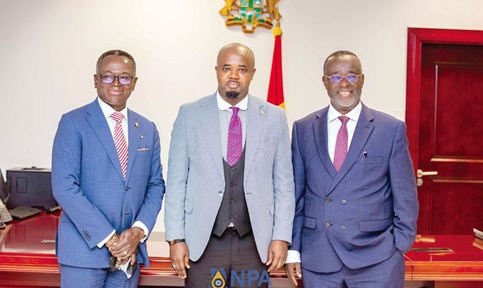The Chief Executive of the National Petroleum Authority (NPA), Godwin Kudzo Tameklo, and the acting Chief Justice, Justice Paul Baffoe-Bonnie, have discussed the possibility of creating a dedicated Petroleum Court to expedite the prosecution of fuel-related cases in the downstream petroleum sector.
The engagement forms part of NPA’s broader efforts to strengthen regulatory enforcement to deter illegal activities undermining the growth and safety of the country’s downstream petroleum industry.
The two held the meeting at the Office of the Chief Justice when Mr Tameklo called on the acting C-J to discuss enforcement in the downstream petroleum sector.
Since 2005, this sector has experienced considerable growth and diversification, attracting substantial private and public sector investment.
However, the existing regulatory framework has not kept pace with the industry's evolving dynamics, particularly concerning criminal activities perpetrated by certain operators.
To address this, the NPA, the body mandated statutorily to regulate, monitor and oversee Ghana's downstream petroleum sector, recognises the need for a robust collaborative partnership with the Judiciary.
The collaboration is, therefore, to ensure the efficient, expedited and consistent adjudication of legal cases within the sector.
Proposal
Mr Tameklo explained that although the NPA had internal structures to resolve some disputes, criminal cases often suffered delays in the general court system.
He emphasised the need for specialised judicial support, either in the form of a dedicated court or by assigning a judge to periodically sit on petroleum-related matters to resolve industry offences swiftly.
“A strong collaboration between the NPA and the judiciary will ensure that offenders are held accountable swiftly, serving both justice and deterrence,” he said.
Mr Tameklo said the growing complexity of the downstream sector, coupled with delays in prosecuting offenders, threatened industry integrity and national economic security.
“Our sector is critical to Ghana’s energy security, and enforcement delays weaken confidence in the regulatory framework,” he said.
Justice Baffoe-Bonnie welcomed the proposal and said it was "worth exploring," but he expressed concern over a shortage of judges and heavy court dockets in the system.
“I support the idea of a dedicated court that can handle your cases with expedition. Criminal prosecution is not just about punishing offenders, it is also about deterrence, letting people know there are consequences for breaking the law,” he said.
Justice Baffoe-Bonnie added that there were limited judicial personnel resulting in a situation where the courts at all levels are overwhelmed with cases.
He, however, proposed that an existing court could dedicate at least two days every two weeks specifically for petroleum-related cases.
Justice Baffoe-Bonnie further lamented the growing culture of indiscipline across all sectors, including the petroleum industry in the country, adding “Ghana is not a poor country, but indiscipline is eating into the very fabric of our society.
Unless we enforce the law consistently and decisively, this trend will continue unchecked”.
Prosecutorial powers
The NPA was granted prosecutorial powers in 2020 under the Appointment of Public Prosecutors Instrument (E.I. 378), empowering the authority to prosecute offenders of the National Petroleum Authority Act, 2005 (Act 691) and related laws.
The proposed collaboration with the judiciary marks a critical step towards ensuring that the NPA’s prosecutorial powers are effectively exercised to safeguard industry integrity and protect consumers.
If successful, the proposed Petroleum Court will mark a significant step in fast-tracking trials concerning the country’s downstream petroleum industry.

